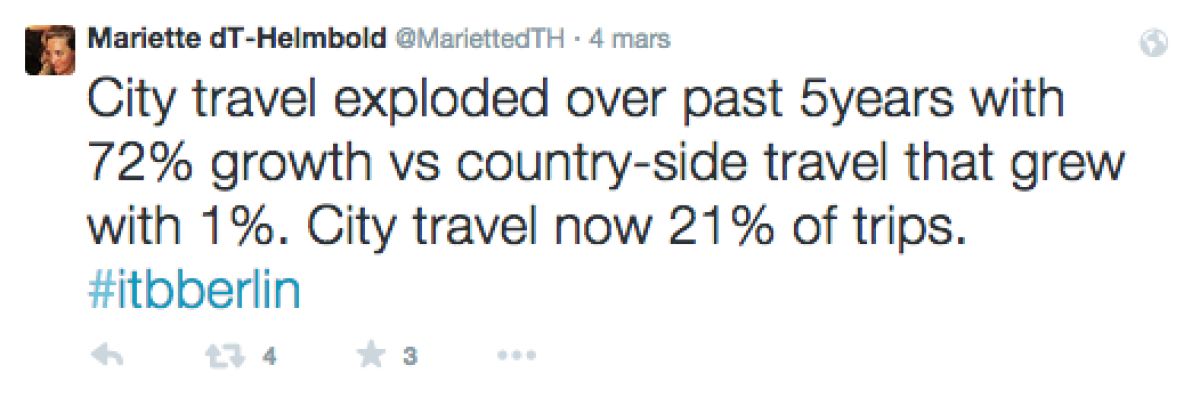TRAVEL TRENDS FOR THE YEAR AHEAD FROM ITB BERLIN
by on 06.03.2015
Destinate is back in Berlin for the world’s greatest travel and tourism gathering, ITB. Trade shows are always a manic couple of days but it is a useful reminder of the scale of tourism globally and just how hard and smart we have to work to stand out.
Saying this, on Wednesday March 4th IPK International released the annual ITB World Travel Trends Report for 2014/ 2015 and these are its most important take outs:
World Travel Trends
The number of travellers increased in 2014 despite crises, war and outbreaks around the world, adding 200 million more outbound nights per year. There is no denying the impact of tourism on the global economy with 3 million more jobs created directly through tourism in 2014.
Outbound travel growth from Africa grew by 4% and inbound travel to Africa increased by 3%.
Long-haul travel grew faster than short-haul travel in 2014, great news for destinations like South Africa.
Americans travelled more in 2014 as economic conditions improved, not only travelling more but also staying longer and spending more. In addition, new travel patterns for US leisure travellers are emerging as consumers become more mindful and look for local experiences, authenticity and engagement with local communities.
Europeans went on shorter trips in 2014 but spend per night went up by 4%. The world can expect a 3% rise in European outbound travel in 2015.
Asia was the key growth driver for the world outbound travel market in 2014 with a growth rate of around 8%. In 2015, Asia is expected to out-travel the rest of the globe once again with 8% growth in outbound trips.
South American outbound travel slowed down in 2014 after years of above-average growth. According to the United Nations World Tourism Organization (UNWTO) ‘the number of international tourist arrivals to South America grew by close to 7% during the first eight months of this year compared to moderate growth of 2.5% in 2013. Much of this growth was generated by Argentines, Chileans, Colombians and other nationalities travelling to Brazil for the World Cup. Weaker growth is expected for 2015 as the continents two largest economies, Brazil and Argentina, continue to face challenges.
One third of the world’s travellers come from five countries: Germany, the USA, UK, China and France. Germany maintained its position as the world’s largest outbound travel market in 2014, ahead of the USA and China.
Forecast data shows that 2015 should be another great year in travel with a 4% global increase in international trips. Travel is expected to outperform global economic growth in 2015.
Urban Tourism

Although beach and relaxation holidays grew by 18% over the last five years and remains the biggest travel category in terms of market share, travel to cities was the fastest-growing market segment with a 72% increase over the past five years. This sector now boasts a 21% market share.
Technology and Tourism

Online bookings now make up the larger share of travel bookings. 66% of travel bookings take place via the internet while only 26% of travel bookings take place through travel agents.
Online bookings continued to increase in 2014 with the use of smartphones. China, the USA and Japan took the top three spots for booking travel via smartphones. In addition, blogs and social media channels are being used more intensively by travellers across the globe to plan trips.
In fact, 92% of social media users have been influenced by travel blogs and ratings in 2014 with up to 72% willing to change their destination choice based on the opinion of friends and networks on social media. In China, up to 95% of travellers use travel blogs as a source of travel information. Comparatively, 86% Indian travellers and 66% of European travellers are influenced by the content of travel blogs.

Millennials continue to drive growth in travel, particularly for the USA, and are rigorous users of technology and social media. In general consumers are leading more “digital lives”, wanting to share their experiences instantly and intimately with their friends and families around the world.
Technology-based ‘sharing economy’ businesses like AirBnB and Uber are posing major challenges for traditional travel suppliers and further travel-related start-ups are being launched to fill in the gaps, such as cleaning and key handover services.
Going forward, technology will continue to impact the travel industry dramatically and traditional travel companies must review century old rules and respond quickly with more innovative products and services.